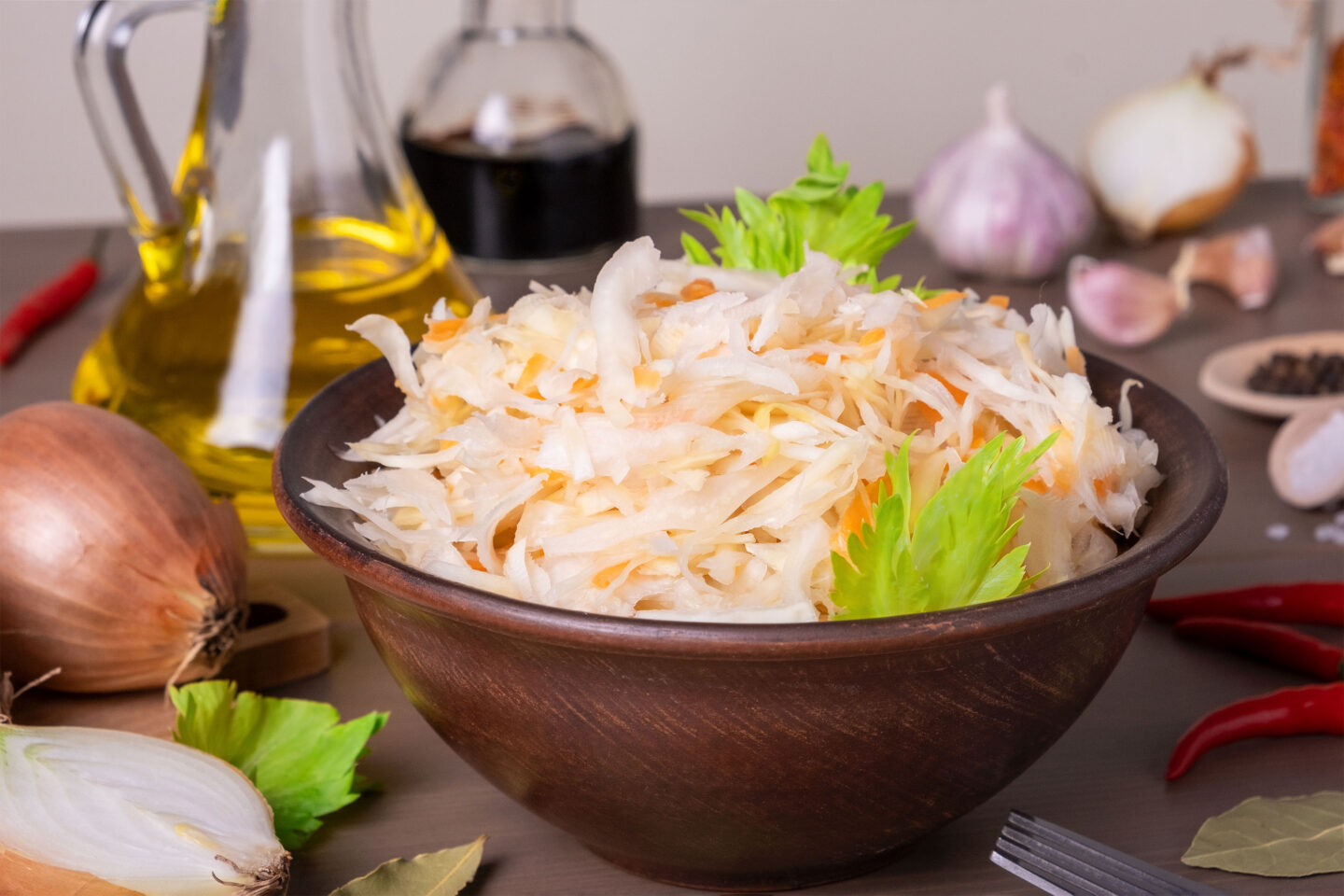Hippocrates described sauerkraut as "a health food." I am guessing that if Hippocrates were alive today, he would be tweeting about sauerkraut with the hashtag #superfood. Or would he? I am equally convinced that if Hippocrates were alive today, he would be a fan of evidence-based medicine.

After all, the Hippocratic School advocated the rigorous recording and documentation of medicine. Back in the day, Hippocrates may have been a fan of recording, but he had to make do with empirical evidence—what he observed in his life and clinical practice. In fact, the first laboratory study on sauerkraut was not done until 1922 (1).
Another fan of sauerkraut, based on empiricism, was Captain Cook, who used sauerkraut to reduce scurvy among his crew (2).
What (if anything) have we learned about sauerkraut since the days of Hippocrates and Captain Cook?
What Is Sauerkraut?
Sauerkraut is finely chopped cabbage that has been fermented with lactic acid bacteria. The term "sauerkraut" translates into "sour cabbage" in the German language. Sauerkraut is often associated with German cooking, but it most probably did not originate in Germany.
There are geographic differences in the way sauerkraut is made. In the US, shredded cabbage is used while in Eastern Europe the whole head of cabbage is used.
Like most fermented foods, sauerkraut evolved as a way to preserve food, which in this case is the preservation of cabbage.
Unlike some other fermented foods that need the addition of 'fermenting bacteria', the lactic acid bacteria used in the fermentation process to make sauerkraut are found naturally in the cabbage.
A 2018 study evaluated the composition of lactic acid bacteria in sauerkraut and found that Leuconostoc and Lactobacillus were the predominant species (3).
The typical content of 100 grams of sauerkraut is:
- energy (17 kcal)
- protein (0)
- fat (0)
- carbohydrates (3.33 gm)
- sugar (0)
- iron (1.2 gm)
- sodium (667mg)
- vitamin C (16 mg)
- vitamin A (0) (4)
Is There Any Research?
My own research found just 159 publications and 3 clinical trials on sauerkraut. When I broadened the search, I found a total of just 18 papers dealing with human health and sauerkraut.
A 2014 systematic review from Germany looked at the effects of sauerkraut on human health (5). They looked back in time to 1921 and found 139 publications. These researchers stated that the majority of these publications came from Europe.
This is quite different from a bibliometric review of sauerkraut from India, which states that 85% of articles on sauerkraut come from India (6). This is an interesting discrepancy, which I can only explain by the fact that the Indian researchers may have access to local publications that the Germans did not have, and vice versa.
To put all this in context, another fermented food, tempeh, has almost 8,000 publications and 800 clinical trials.
Does it Boost Cognitive Health or Mood?

There are no studies on sauerkraut and cognitive function or mood.
Bottom Line
Sauerkraut has not been shown to help cognitive function or mood.
Does Sauerkraut Improve Digestion?
Here, we get to talk about one of the three clinical studies. A 2018 study looked at the effect of lacto-fermented sauerkraut on 34 Norwegian adults with irritable bowel disease (7).
Half of the study participants received pasteurized sauerkraut, while the other half received unpasteurized sauerkraut. The study took place over 8 weeks.
Study participants in both groups reported statistically significant improvements in symptoms. In addition, statistically significant changes in the microbiota were noted with increases in the number of Lactobacillus plantarum and Lactobacillus brevis.
The researchers concluded that the change in the microbiota was most likely due to probiotics in the sauerkraut rather than to the actual lactobacilli in the sauerkraut. Probiotics are substances found in food that can promote the growth of bacteria in the gut.
The oddest study I ever read has to be a French study from 1999 that looked at patients with mesenteric angina (8). Mesenteric angina occurs when people have a limited blood supply to their gut, and this causes pain when they eat as their gut does not have the ability to handle food well.
I feel obliged to include the study as it is one of the three clinical studies on sauerkraut, but be warned, it is odd. The original article is in French, which is not a barrier. Only the abstract is available online, which should not be a major barrier, but it turned out to be an issue. The authors looked at 1837 patients with mesenteric angina but selected just 8 of these patients.
These 8 patients were randomized to either receive cassoulet (a stew with pork, beef, and beans) or sauerkraut. The abstract states that there was a significant difference between the two arms of the study but does not say which way and does not state what the differences were.
Actually, to be specific, the abstract states that there is a "significative" difference between the two arms of the study.
Now to the weird part. The study concludes with the statement that a "regular absorption of couscous is therefore recommended." I just can't join the dots here. I know that I must be missing something. How did the authors get from cassoulet and sauerkraut to couscous? I do apologize, dear reader, but I really don't know.
The only other paper on sauerkraut and the gut was an evaluation of the effects of different vegetables on the absorption of supplementary iron, and not iron absorption from the actual vegetables (9).
The study found that taking iron with sauerkraut led to better absorption of the iron as compared to other vegetables eg lentils, spinach and butter beans. What this study does not capture is the total iron absorption from the supplemental iron and the iron in the vegetables themselves.
Bottom Line
Sauerkraut has not been shown to improve symptoms of irritable bowel disease in high quality scientific research.
Does it Improve Immune Function?
There are no studies showing that sauerkraut can help with immune function. There is evidence that sauerkraut can cause problems for the immune system which we will discuss in the safety section later in this article.
Bottom Line
Sauerkraut does not help the immune system.
Does It Reduce Inflammation and Allergies?

Sauerkraut causes local inflammation in the bowel and this can cause diarrhea (5).
As we will discuss in the safety section, sauerkraut can actually cause allergies.
Bottom Line
Sauerkraut can cause (and not help) inflammation and allergy.
Does It Help Fight Cancer?
Aromatase is an important enzyme in the evolution of breast cancer. In vitro studies show that sauerkraut down-regulates the expression of aromatase (10).
A 2011 study of risk factors of laryngeal cancer in Heilongjiang province, China found identified sauerkraut, barbequed food, and smoking as potential risk factors (11).
Bottom Line
There is no clinical evidence to suggest that sauerkraut can fight cancer but there is epidemiological data to suggest that sauerkraut may be a risk factor for laryngeal cancer.
Is Sauerkraut Safe?
Monoamine oxidase inhibitors (MAOIs) are a class of drugs used to treat depression (12). They prevent the breakdown of monoamines including tyramine. People on these drugs have to avoid certain other interacting drugs and are typically placed on a specific MAOI diet (13).
The rationale for this is to avoid what is known as an MAOI reaction which presents with headaches, dizziness and hypertension and even death (14).
Sauerkraut contains tyramine and features on the MAOI diet as one of the foods to be avoided. In fact, a 1996 study identified sauerkraut as one of the foods with what was described as dangerously high concentrations of tyramine (> or = 6 mg/serving), along with chicken liver, air-dried sausage and soy sauce (15).
A 1995 paper questioned the relationship between sauerkraut and MAOI reactions as they noted that 50% of patients on MAOIs who were hospitalized for other reasons reported consuming sauerkraut in the past month (16).
The authors of this paper took this as circumstantial evidence that the sauerkaut-MAOI reaction was not such a big deal. I disagree. The risk of a sauerkraut-MAOI reaction is possibly death. Best to stick to the guidelines and avoid sauerkraut if taking MAOI for any reason.
Sauerkraut has a high content of histamine. This brings us to our third clinical study on sauerkraut (17). Investigators found that 75 mg of pure liquid oral histamine which is comparable to that found in sauerkraut can cause allergic reactions.
This is especially problematic in susceptible people during hay-fever season but can also occur in non-allergic people. It is worth noting that although this study counts as one of the three studies on sauerkraut, it does not actually look at sauerkraut. It looks at the histamine load and extrapolates to sauerkraut.
Conclusion
We have three clinical studies on sauerkraut.
One was helpful and studied sauerkraut in irritable bowel disease and points toward possible benefits.
One was a weird study on French cassoulet which I don't understand.
The last study looked at histamine and extrapolated back to sauerkraut.
I think that it is fair to say that we don't know much more about sauerkraut than Hippocrates or Captain Cook.

Leave a Reply